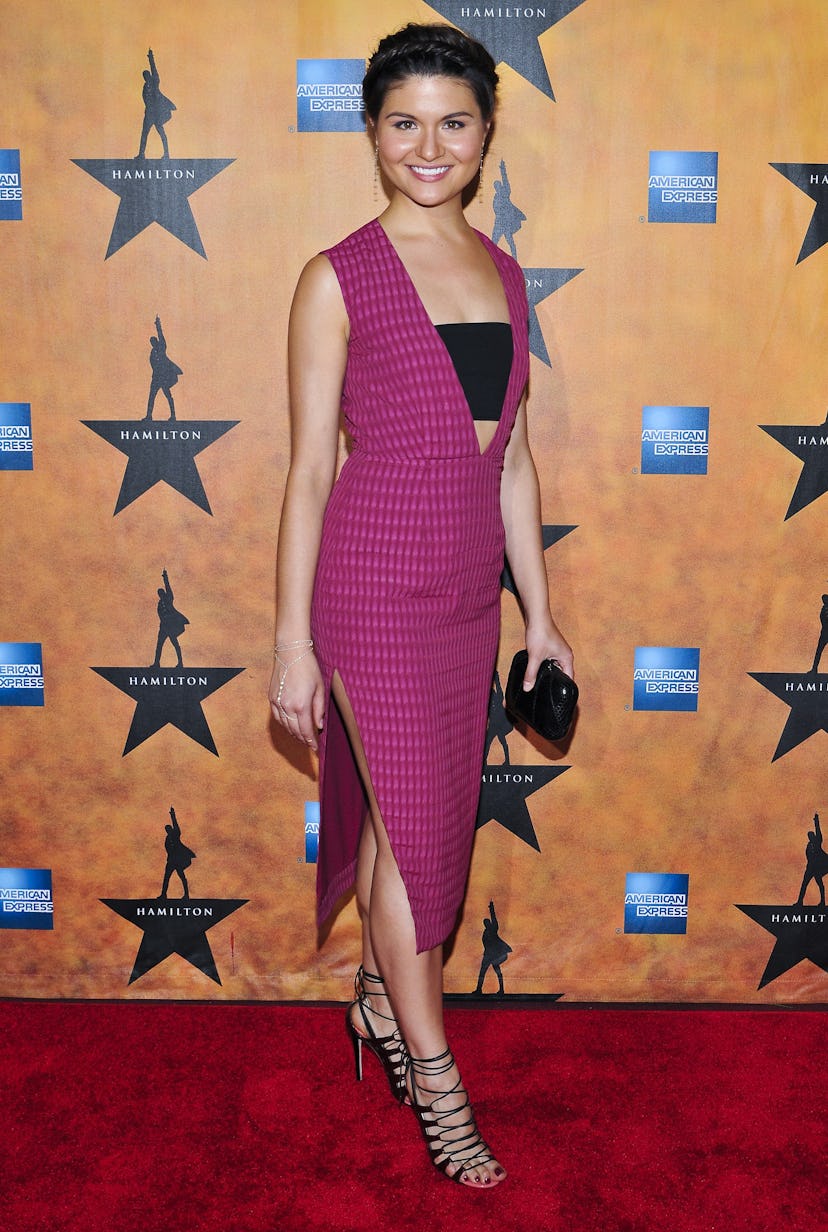The Multifaceted Phillipa Soo

One might assume from the name that Hamilton: The Musical, the much-lauded theatrical rollercoaster ride penned by Lin-Manuel Miranda (also its star) and based on Ron Chernow’s 800 plus page biography of Alexander Hamilton, is predominantly focused on the trajectory of its titular character. But the Thomas Kail-directed production, which opened at the Richard Rodgers Theatre last week after a sold-out run at the Public Theater earlier this year, is as much about the personalities surrounding the founding father, chief among them his wife Eliza Schuyler Hamilton, played by Phillipa Soo. As embodied by the 25 year-old Julliard graduate—who previously received raves as Natasha in the 2013 Off-Broadway Russian electro-pop operatic interpretation of War and Peace entitled Natasha, Pierre and the Great Comet of 1812—Eliza is a quietly strong counterpoint to her fast-talking, relentless husband. Embarking on a deep emotional journey, she goes from sweet spouse to wronged woman to mourning mother over the course of the three-hour show. Here, Soo discusses forgiveness, racial diversity and beatboxing.
Between the script, the biography of Alexander Hamilton and conversations with its author Ron Chernow, how did you go about crafting Eliza’s emotional background? We know she was a very warm and generous person and she lived to be 97, which is so incredible, especially back then. We actually don’t know that much about her and Alexander’s relationship and it was kind of interesting for me to use that ambiguity to my advantage and formulate what that would be. And I definitely learned a lot about forgiveness and what that means, how sometimes forgiveness is even more powerful than love. In her day, women weren’t really considered people like men were, but without her we wouldn’t know anything about Alexander Hamilton. She was the one who collected his papers after he died. She wanted to honor him and honor his name and honor his legacy.
Musically, how familiar were you with R&B and hip hop? Eliza doesn’t really rap, but you have a moment of beatboxing on stage. It was something I was hoping I was going to be able to do. Hanging out with all of those guys who were beatboxing, I was just learning on my own and fiddling around. And then one day Lin was like, I think you should beatbox in this scene. And I was like, Finally! It’s so much fun. I look forward to that moment every night. I’m not necessarily well versed in hip hop, but I grew up with a lot of R&B, a lot of Motown. My dad loved BB King and Stevie Wonder and Aretha Franklin. I grew up outside of Chicago. And I watched the Blues Brothers a lot as a kid. But then I actually studied classically so I started out doing voice lessons when I was in middle school and did a lot of arias and German art songs. And then of course, I loved my female singer-songwriters, Eva Cassidy and when I got to high school, Regina Spektor and Ani DiFranco and all these amazing women who are also writers. I think a lot of music has shaped my experience.
The cast is incredibly diverse. What has that experience been like for you, being part of a musical that has people who are from everywhere and yet is telling a tale about white men in wigs? Even though they were these old white men and it’s this archaic idea of these political figures, I don’t think we can forget they were real people. Alexander, he was an immigrant, he came here from the West Indies. Our founding fathers came here to start something new because they wanted to leave the situation that they were in. Very personally, my grandmother and grandfather came to the United States from China in the 1940s. And then you look at everyone else in the cast who has immigrant stories. I think if anything, instead of separating us from these founding fathers, it’s brought us closer to them in a way. Also, I’m mixed race and it’s really great to be in a cast of people who are mostly mixed. Or if they’re not mixed themselves, the mix that is going on between all of us is so cool that it just feels right. I don’t even think we think about it because we’re just telling the story. But then when we step back and look at how incredible it is. It is really breathtaking just to see how different we all are.
When did you first fall for theater? The earliest that I can remember appreciating the theater was when I was about 8 or 9 and we went to see The Tempest and it was in this very small space, basically an empty space they turned into this theater. Ariel came out wearing this nude sparkly thong and these spike pumped heels and some of the muses were wearing these gossamer gowns. I just thought it was the most magical thing in the world.
Between Natasha, Pierre and the Great Comet of 1812 and Hamilton: The Musical, you’ve appeared in two very unorthodox, innovative takes on a historical musical. What’s next? There are so many different ways I can go. But I don’t have to worry about that because I can be present in it right now. I can just sit in this for now and enjoy this experience through the next who knows how long I’ll be doing it, which is a beautiful thing because it’s so rare in this business that you can say that. But I joke around with people and say, Oh you know, next I’ll do a straight comedy where it’s contemporary and I’m wearing my own clothes and I’m sitting on a couch and I’m not singing.
Photos: The Multifaceted Phillipa Soo
Phillipa Soo. Photo by Getty Images.
“Hamilton.” Photo by Joan Marcus.
“Hamilton.” Photo by Joan Marcus.
“Hamilton.” Photo by Joan Marcus.